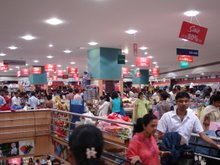‘It is easy to achieve success; it is difficult to maintain it’
 Future Group CEO Kishore Biyani had a two-hour breakfast meeting with ET’s Indrajit Gupta and Kala Vijayraghavan earlier this week, in which he shared the logic behind the retail group’s new makeover. Excerpts from the interview:
Future Group CEO Kishore Biyani had a two-hour breakfast meeting with ET’s Indrajit Gupta and Kala Vijayraghavan earlier this week, in which he shared the logic behind the retail group’s new makeover. Excerpts from the interview:
You seem to have segregated mature and new businesses. Why?
We are immunising mature businesses from the risks we face in new businesses. So we can form a clear P&L account of every retail brand. Today, our formats have become so big, we are competing with ourselves. Earlier, products and operations worked together. I was accountable for everything. But today, growth is so much that somebody else has to concentrate on that growth. Earlier, we were hungry for topline. Now, we are hungry for bottomline growth. Accountability for the profitability of the lines of businesses lies with one individual now. And profitability of a category lies with the individual handling the product in that category. We have to look at the costs of doing a business. The fact that we have been able to cut costs in the last few months has improved margins. We are getting result oriented.
For somebody who did not think much of processes, isn’t a lot of attention suddenly seems to be going into that area?
Every retail data (even Harvard studies show that) has only 70% accuracy. Therefore, a whole lot of decisions have to be based on gut feeling. Processes do not make a retail business. Human emotions make retail. For instance, if there is some bad news in the morning, or on a gloomy day, sales are at rock-bottom. Processes can’t capture all these things. As a group we believe that demand creates supply, supply does not create demand. You have to do retail to do processes. I think processes do not allow you to react to a consumer. Processes work when you think everything is constant. But nothing is constant. Consumers are not constant. At 30 years of age a consumer behaves differently from what he will do at 34, assuming he is married or has a kid. Processes are a way to deliver consistently to the consumer.
How do you decide which businesses will be relevant in the long run?
You need businesses outside retail to support the retail business. The margins aren’t enough to support growth. So, for instance, in our real estate business, we get 20% margins, but we have partnered somebody who knows how to run it. If there is no potential for a business to cross Rs 100 crore in the second year of operations, we are not interested. We developed pharmacy and beauty parlours, but we may not run it ourselves. As a group, fashion will be nearly 40-50% of our businesses and through that we will be able to raise margins by 5-8%.
Looking back, do you think there’s something you would ideally never have taken up, something that didn’t succeed?
I always believe that unless you do it yourself, you will never learn. There are no shortcuts. My biggest mistake was that I made cinemas. Cinema teaches you that although you think you know everything, you really know nothing. Today, all that humility and acceptance come out of doing cinema as a business. It taught me to be dispassionate about what you create. Without the cinema experience, we would never have learnt anything. It is easy to achieve success. It is difficult to maintain it.
Rakesh Biyani has taken over as the retail CEO. Did the group consider getting anybody from outside?
There was an option to bring in an outsider. But even within our organisation, people will move up some day. Bringing in an outsider sometimes does not make sense. We did not want to lose the comfort factor with our senior people. Rakesh has come in through consensus. We are open about everything. The vote went in his favour. Acceptance is important. Continuity is important.
Courtesy: EconomicTimes


No comments:
Post a Comment